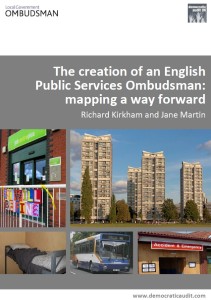The creation of an English Public Services Ombudsman: mapping a way forward
Strong democracies should be backed up by robust accountability frameworks, an aspect of which includes redress mechanisms. In a new report published by Democratic Audit, Richard Kirkham and Jane Martin, the Local Government Ombudsman, explores the current debates surrounding the proposal to integrate the ombudsman community in England. In this extract from the report they consider why the consensus in support of this proposal has not yet produced agreement on the way forward.

Read our new report into the creation of a single Public Services Ombudsman for England (see report for image credits)
It is now widely understood that the austerity drive of the Coalition Government has triggered a distinctive shift in the model of public service provision in England. A significant aspect of this shift is the hastening of a drift towards consumer democracy which, amongst other impacts, has forced the ombudsman world to reconsider the strength of the redress service that it provides. This reflective process has led to the reappearance of the long-standing proposal to harmonise existing ombudsman schemes into an integrated Public Services Ombudsman (PSO) for England.
At its strongest, the proposal to form an English PSO entails the harmonisation of multiple schemes, plus the reconsideration of the office’s powers. Given the potential scale of the project and its need for new legislation, the formation of an English PSO should be considered a major exercise in reform. By contrast, minimalist approaches to ombudsman reform reduce the chances of meaningful reform being implemented and run the risk of the ombudsman system being restructured in a manner insufficiently robust or flexible enough to meet the challenges of the future.
But major reforms require a high degree of political will to secure implementation and are hampered by the lack of a clear process in the administrative justice system as to how such projects should be conducted. In response to this dilemma this paper highlights both the reasons why major reform in the ombudsman sector is necessary, and the different perspectives on administrative justice that should be accounted for within that reform process. As well as outlining the key features that should be included in a 21st century ombudsman scheme, we conclude the paper by drawing together some principles which should inform the creation of an integrated ombudsman scheme. So long as sufficient political capital in the project can be secured, combined these principles have the potential to align the capacity of the ombudsman system with the public service model that has evolved in modern England and in so doing allow it to contribute fully to the promotion of administrative justice.
The long-standing problem of ombudsman reform in England
The basic argument for harmonisation is that the current design of the English ombudsman sector is only explicable as the end product of an uncoordinated set of historical events. The first ombudsman scheme in the UK was introduced in 1967 with a limited jurisdiction and without proper consideration of the option of a public sector wide ombudsman scheme. This was followed, over time, by the introduction of new ombudsman schemes in response to new pressures in different parts of the public sector. Throughout this process little thought was ever given to the overall structure of the administrative justice system, resulting today in a network of multiple overlapping schemes which do not always map onto the delivery of 21st century public services in a comprehensible, efficient or possibly even effective manner. To address this mismatch, the time has come to redesign the structure of the ombudsman sector in England in a manner that is appropriate for the way that public services are delivered today and into the near future.
A number of subsidiary arguments for reform in the ombudsman sector can also be identified, such as the unnecessary complexity that the existing system presents users of ombudsman services and the potential for the ombudsman enterprise to achieve more than it currently does. Adopting these arguments, the list of proponents of reform of the current structure of the ombudsman sector in England is a long one, and includes a 2000 Cabinet Office report, many current and former ombudsmen and most recently a Parliamentary select committee inquiry. Moreover, the solution to the problem most often advocated is the unified ombudsman model, as has been introduced in Scotland and Wales and is planned in Northern Ireland. Other countries too tend to favour a general purpose ombudsman over the specialised ombudsman model, which is dominant in England.
But despite the degree of support for the harmonisation plans, reform of the network of ombudsman schemes in England has proved elusive for some considerable time. A major barrier to reform has always been the need for cross-cutting legislation, as the nature of the underlying problems in the English Ombudsman sector is that they can only be fully addressed by an initiative that moves beyond incremental efforts to amend or tinker with existing legislative schemes. But the challenge of coordinating such a wide-ranging reform initiative is a ‘wicked’ problem, in which most of the key stakeholders recognise the merits of change but there exists a lack of coordinated energy to drive the agenda forward. A key difficulty is the disparate oversight of the ombudsman sector in government and Parliament. Partly as a result, even when momentum has been created in the past, a myriad of conflicting concerns about the proposal have arisen to provide strong incentives for one or more parties to disengage from the process.
But with the Coalition Government looking for legislation to fill its final year in office, 2014/15 might represent the best opportunity in a generation to implement change in the ombudsman sector. Despite the difficulties, therefore, in this paper we consider what a fully rounded approach to thinking about ombudsman reform would look like.
Channelling thinking on administrative justice
The starting premise for undertaking reform in the ombudsman sector should be that the ombudsman is designed with the core objective of contributing to the delivery of administrative justice. Although an uncontroversial premise, the challenge in choosing the goal of administrative justice as the launch pad for redress design is that the concept is short of substantive meaning. Thus the public may expect ‘justice’ to be delivered by public sector providers, but it is improbable that a theory could be devised that could explain the substantive meaning of administrative justice in every instance of administrative decision-making. Instead, the idea of administrative justice captures a wide variety of competing values and aspirations, about which there will always be contested interpretations of fact and policy viewpoints at play, and limitations on the resource capacity of administrative agents to deliver.
In response to this apparent relativity of values, administrative justice is ordinarily understood to be upheld through an extended series of procedural protections which aim to ensure that all relevant interests are properly factored into decision-making. But there is no single procedural model of administrative justice. Thus there are different processes for overseeing the manner in which laws and rules are made; administrative discretion is exercised; citizens acknowledge or resist those decisions; and the veracity of those decisions are checked, reviewed, amended and verified. What, therefore, can the goal of administrative justice tell us about how the ombudsman sector should be reformed?
In this new report we offer three interlinked accounts of the driving forces behind the processes by which administrative justice is delivered and which in turn should underpin initiatives to reform the ombudsman system in England.
—
Note: This post and the full report represent the views of the authors and do not necessarily give the position of Democratic Audit or the LSE. Please read our comments policy before responding.
—
 Richard Kirkham is a Senior Lecturer in the School of Law at the University of Sheffield, and director of the Centre for the Study of Law in Society. Previously he worked at the Audit Commission, and is the co-author of the book The Ombudsman Enterprise and Administrative Justice (Ashgate, 2010).
Richard Kirkham is a Senior Lecturer in the School of Law at the University of Sheffield, and director of the Centre for the Study of Law in Society. Previously he worked at the Audit Commission, and is the co-author of the book The Ombudsman Enterprise and Administrative Justice (Ashgate, 2010).
 Jane Martin is the Local Government Ombudsman and Chair of the Commission for Local Administration in England. She was appointed as ombudsman in January 2012. Previously she was director of the Centre for Public Scrutiny, deputy chief executive of the Local Better Regulation Office and an academic at the University of Birmingham and Warwick Business School.
Jane Martin is the Local Government Ombudsman and Chair of the Commission for Local Administration in England. She was appointed as ombudsman in January 2012. Previously she was director of the Centre for Public Scrutiny, deputy chief executive of the Local Better Regulation Office and an academic at the University of Birmingham and Warwick Business School.







 Democratic Audit's core funding is provided by the Joseph Rowntree Charitable Trust. Additional funding is provided by the London School of Economics.
Democratic Audit's core funding is provided by the Joseph Rowntree Charitable Trust. Additional funding is provided by the London School of Economics.
UK: The creation of an English Public Services Ombudsman: mapping a way forward https://t.co/qKkfH60sqk #gov #custserv
The creation of an English Public Services Ombudsman: mapping a way forward https://t.co/57FwPKK6zh /cc @frazzy123
The creation of an integrated Public Services Ombudsman for England: mapping a way forward https://t.co/f3hCGlRGou
Creating an integrated public services ombudsman: how and why https://t.co/ZKVfJYAdEq
Article on delivering a public services ombudsman from @LGOmbudsman & @RichardKirkham7 via @democraticaudit https://t.co/tmstbBafMw
The creation of an English Public Services Ombudsman: mapping a way forward https://t.co/8NKeB2PTol
The creation of an English Public Services Ombudsman: mapping a way forward https://t.co/RGytBhyH3j
“@democraticaudit: The creation of an English Public Services Ombudsman https://t.co/SEq6xhHFQh” new article from @LGOmbudsman